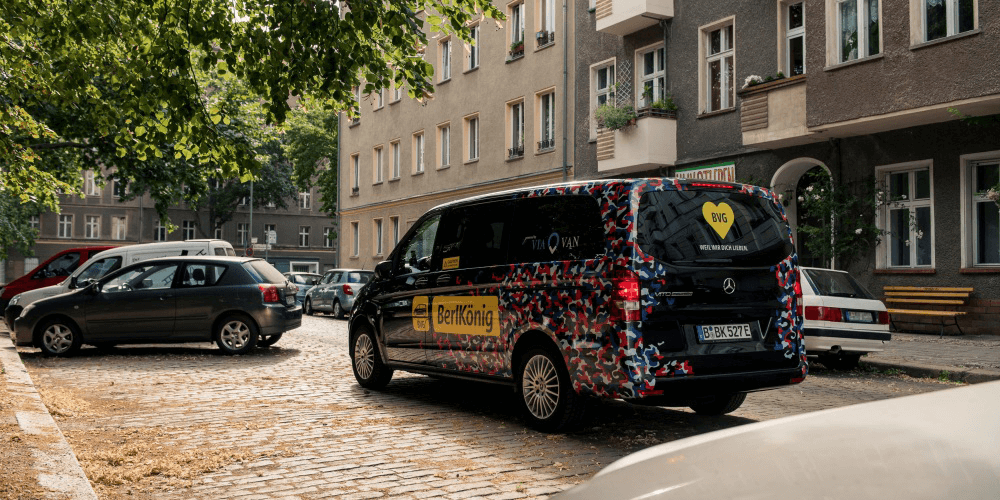Headwind for two e-mobility projects in Berlin
In Berlin, a seemingly unlikely coalition is blocking two electric vehicle projects. The trade union Verdi refuses the purchase of 90 new electric buses by transit operator BVG. On top, the Senate could stop BVG’s and ViaVan’s ridesharing offer BerlKönig as early as April.
++ Kindly find all updates to this article below. ++
But first to the electric buses: This is about money. The trade union Verdi is not against e-mobility in general; the coaches are instead a means of pressure. Last year, Verdi had achieved higher wages for BVG employees (including strikes), which cost the transport company around €100M.
As local media now reports, the Berlin Senate only wants to take over half of that, meaning the remaining 50 million euros to finance the wage agreement are not yet covered. Since, in Verdi’s view, the Senate is not keeping its promises, the union has announced that it will not agree to the order of 90 electric buses BVG and the state of Berlin had placed with Solaris last June. A meeting of the BVG supervisory board scheduled for this Friday has already been cancelled.
The second project is also about a mixture of politics and finances. The ridesharing service BerlKönig, launched in 2018 and scheduled to run for four years as a pilot project, could already cease operations at the end of April. BVG operates the project together with ViaVan, a joint venture between Mercedes-Benz Vans and the US carsharing Via.
Now the Tagesspiegel writes that BVG could not promise ViaVan a continuation of the cooperation (“intention to award contract”). Allegedly because the coalition of the social democrats, the left-wing party and the green party “did not want this”. The initial contract already expired at the end of January, yet ViaVan (which bears the costs of operation) and the BVG could still agree on an extension until the end of April.
Should the service be discontinued, however, the complete conversion of the BerlKönig fleet to electric vans promised by the end of 2020 would be rendered obsolete. BVG also wants to expand the BerlKönig business area to cover more parts of the city, but a permit applied for in October has not yet been granted. For those not having travelled in Berlin, BerlKönig offers prices that undercut taxi fares considerably. The cab sector, however, is regulated, drivers need to have a taxi license. A fact even Uber had to circumvent by effectively acting as an intermediary between its users and professional car-hire companies or existing taxi fleets instead of its network of independent drivers.
According to the Tagesspiegel report, the future of BerlKönig could be decided on 13 February: The next round of coalition talks on the ridesharing service is scheduled for that day. At the meeting on 5 December 2019, the politicians apparently could not agree on a continuation, especially the SPD and the Green transport senator Regine Günther were allegedly very sceptical. Without a commitment from the coalition round in mid-February, “we will, unfortunately, have to discontinue the showcase project despite the very positive reception,” the BVG announced in a letter to the Senator of Transport, submitted to the paper.
Only one thing is certain at present: BVG is in for an exciting February.
With reporting by Sebastian Schaal, Germany.
Update 18.02.2020: Berlin politicians and public transport operator BVG apparently were unable to reach an agreement on the future of BerlKönig last Thursday, according to local media information. The BVG had made it clear that the project would only run for two years. To be able to offer the service throughout Berlin, 43 million euros would be needed. The traffic experts of Red-Red-Green, however, felt that this was too much. According to them, the BVG had deceived them regarding cost.
“We have presented our arguments and hope to have convinced them”, said BVG spokeswoman Petra Nelken on Thursday afternoon. Currently, the BVG has no other partner for the project. Until May, they would not find a new one either. ViaVan had also only expected the two years – if only because of the high investments. A promise of state funding would now be necessary, otherwise the project would be finished by May.
The transport policy spokesman for the SPD parliamentary group, Tino Schopf, however, announced a decision by his group for today. According to Schopf, a four-year pilot phase until fall 2022 had been agreed upon with the state of Berlin. It was unacceptable that the BVG would now put pressure on the senate. Right from the start, it was said that the state would not bear any costs from the BerlKönig service. However, if the BVG now demands more than 43 million euros annually, other transport projects would have to be cancelled. Harald Moritz, transport policy spokesman for Alliance 90/The Greens, described the behaviour of the Berlin transport companies as “unfavourable”. Especially in view of the fact that the BVG could have informed the House of Representatives about the imminent end of the Via and Mercedes contracts at two BerlKönig meetings at the end of 2019. The BVG already had plans that went far beyond the test phase. For example, documents would show the financing requirements until 2025. In total, the state of Berlin would even have to contribute around 170 million euros in order to establish the offer throughout Berlin – fully integrated into the BVG offer and at the currently competitive prices, according to local press.
Update 19.02.2020: In their meeting on Tuesday, the SPD and Left parliamentary groups decided against financing the continued operation of BerlKönig. The Green party is of the same opinion, but postponed a resolution. According to the current situation, the BVG project will be discontinued at the end of April.
ViaVan also released a statment. The “future of BerlKönig has been followed with great concern”, they say. In the past two years, ViaVan invested heavily in the joint research and development project with BVG to ensure that BerlKönig could develop into an “extraordinarily successful demand-driven addition to the existing public transport system”. In total, the on-demand service carried 1.5 million passengers. Customer satisfaction was at an impressive 97 per cent.
Nevertheless, ViaVan is grateful to the “partners at BVG and the Berlin Senate for their support of the BerlKönig”. And they do not want to write the project off completely: “We are still committed to its future. BerlKönig has enormous potential to expand access to public transport, especially at times and places where line-based public transport has gaps, as well as for people for whom conventional services are often a challenge due to mobility restrictions. We look forward to working with the relevant parties to jointly create a sustainable, long-term future for this important new building block of public transport infrastructure in Berlin”.
Additional reporting by Chris Randall.
berliner-zeitung.de (electric buses), tagesspiegel.de (BerlKönig), rbb24.de (Update), morgenpost.de (Update II, all in German)





0 Comments